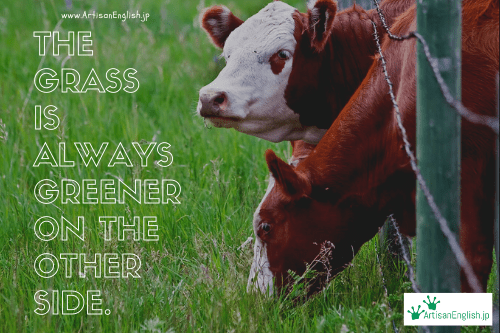
YouTube / iTunes / Spotify / Radio Public / Pocket Casts / Google Podcasts / Breaker / Overcast
Listen to ArtisanEnglish.jp posts & lesson intros here.
Proverb: The grass is always greener on the other side
As Christmas and the end of 2021 are fast approaching, our thoughts tend to turn toward what we desire.
However, the grass is not always greener on the other side.
There is a theory that the things we don’t have drive our behaviour.
The grass is always greener on the other side is a proverb commenting on human desire. We always want what others have, but we don’t.
We are all prone to envy; it’s part of being human.
Many factors go into something appearing better than what we currently have.
For example, you may think that someone else has a better job or more money than you do, but you don’t know about their stress or commitment level.
If you knew the truth, you might realize they do not have an easier life at all.
We are motivated by greed, and our desires for material things can often override our needs for safety and stability.
Sometimes these things are good for us in moderation, but they can make us unhappy with our lives when they become obsessions.
The proverb the grass is always greener on the other side is a statement about human desire.
It has existed for millennia and can be traced back to the year 43 BC.
At that time, it existed as ‘the harvest is always more fruitful in another man’s fields.’
In 1545 it was translated from Latin into English by Richard Taverner as ‘The corn in another man’s ground seems ever more fertile and plentiful than our own does.’
People are people no matter the language they speak, where they are from, or what period of history they live in.
The holiday season is a time to count our blessings.
Be happy with what you have, and remember, the grass is always greener on the other side, but it’s not your grass.
Flesch-Kincaid Readability Test
This post is understandable by someone with at least a 7th-grade education (age 12).
On the Flesch-Kincaid reading-ease test, this post scores 71.
The easier a passage is to read, the higher the score on a scale of 0 – 100.

